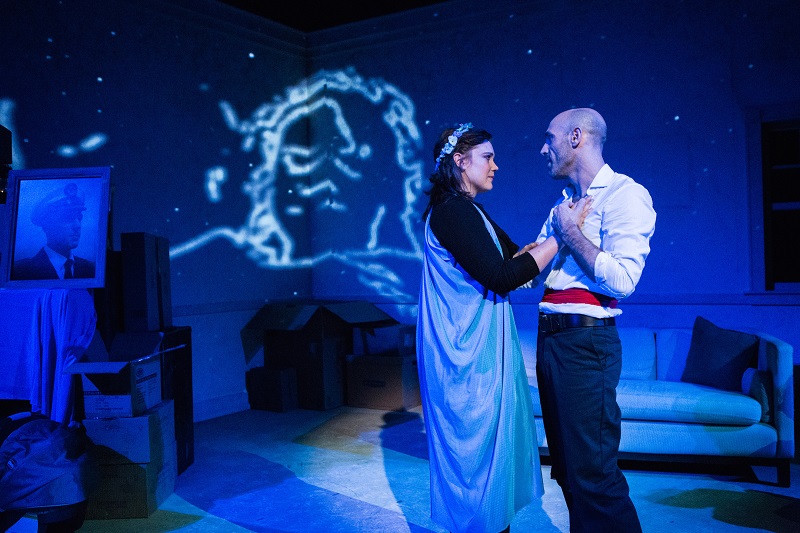
If you have ever dreamed of watching Batman fight in the midst of a Shakespeare production, now is your chance to make that fantasy a reality. How fantasy in the form of storytelling (Batman included) intertwines with our lived realities partly drives Jordan Reeves' imaginative adaptation of Shakespeare's Pericles. Reeves' Pericles: Born in a Tempest both streamlines the sprawling original and weaves in a modern framing narrative in which the Shakespearean text becomes a book, The True Tales of Pericles, given to a woman by her recently deceased father. Of course, Shakespeare, arguably with a collaborator, was himself adapting a well-known medieval romance, the tale of Apollonius of Tyre, primarily the version set down by John Gower in his fourteenth-century Confessio Amantis; and this tale in turn likely derives from a classical Greek source. From this perspective, Reeves' version of Pericles acts as the latest example of how the same story can persist and change over centuries to meet the needs of its readers and audiences.
The onstage audience here is primarily a cranky infant, whose parents decide to use The True Tales of Pericles, credited to Gower (who acts in Shakespeare as the Chorus) as a distracting entertainment in the midst of a storm both literal and symbolic. The adults who are present read and act out parts, and the play modulates between this "real-world" acting out of the tale and a "straight" staging of Pericles. At times, household items are cleverly pressed into service as props and costume elements, as when a selection of stuffed toys figure in the presentation of the knights at a tourney held to compete for the love of King Simonides' daughter and Pericles' future wife, Thaisa. If that sounds like something out of a stereotypical adventure story, it is: even in Shakespeare's own time, elements of this play would have been regarded as old-fashioned, and the role of Gower as Chorus draws attention to its story as a story. Thus, the playfully artificial repurposing of, for example, a model ship or sailor's uniform in acting out these "true tales" is perfectly in keeping with the spirit of this production's Renaissance forbear, while dynamically reinventing it.
An important aspect of this reinvention lies in how it keeps things small, which may seem like a funny thing to say about a play with two disasters at sea and a surprise pirate raid. The small cast, though, and small, living room set, emphasize the domestic components of Pericles and the father-daughter relationship at the center of it and of the frame narrative. (It additionally provides an interesting countercurrent to more spectacle-friendly productions such as Trevor Nunn's 2016 Pericles for Theatre for a New Audience.) One of the biggest payoffs for this intimate approach comes when the show complicates Pericles' climactic reunion in a clever and emotionally powerful way. On a lighter note, it also allows amusing speculation for the audience about just how much of the brothel section and the bargaining over Pericles' daughter's virginity the baby is absorbing as part of its bedtime story.
The cast play their multiple roles, only some of which are touched on here, with aplomb. Jacques Roy makes an excellent Pericles, charismatic and assertive, yet courting Kathryn Metzger's Thaisa with winning shyness on the part of both parties. Tom Schwans lands a lot of big comic beats, not least as the madam of the brothel alongside Metzger's Boult. His affronted reaction when Pericles' daughter, Marina, asks, "Are you a woman?" foregrounds the kind of joke that the seventeenth-century's all-male casting would have made available but also works as a sharp modern spin. Jordan Kaplan gives an impactful performance, particularly as the father of the child being read to, while Patricia Lynn deftly covers a wide emotional range and brings warmth and humanity not only to her frame character but to one of Shakespeare's most preternaturally pure daughters. The production design too is inventive and effective, including some striking use of projections.
The subtitle Born in a Tempest, aside from potentially punning on born/borne, evokes Shakespeare's other late-period play centered on a shipwreck and a father-daughter relationship. The modern framing elements could also be seen as a nod to The Taming of the Shrew's storytelling prologue with Christopher Sly. But its most significant intertextuality arises in its use a prism through which one woman can perceive her father's loss, her child, and her family. How she uses the tale of Pericles models how we can all use Shakespeare, in whatever form his work takes, as well as the theater more broadly. Pericles: Born in a Tempest is lively, funny, and affecting: a great opportunity to (to paraphrase Shakespeare's Gower) hear an old song newly sung. - Leah Richards and John Ziegler
